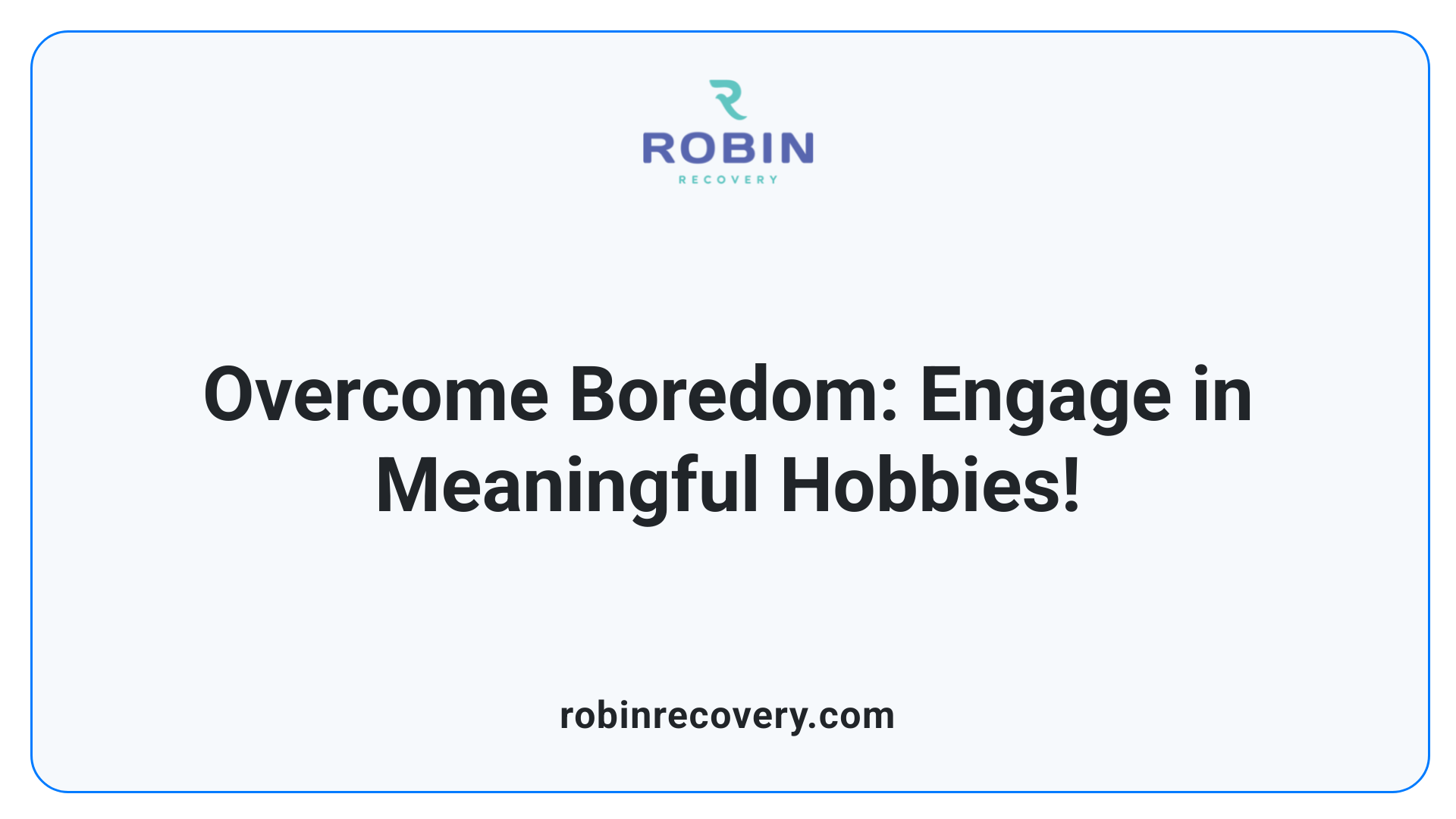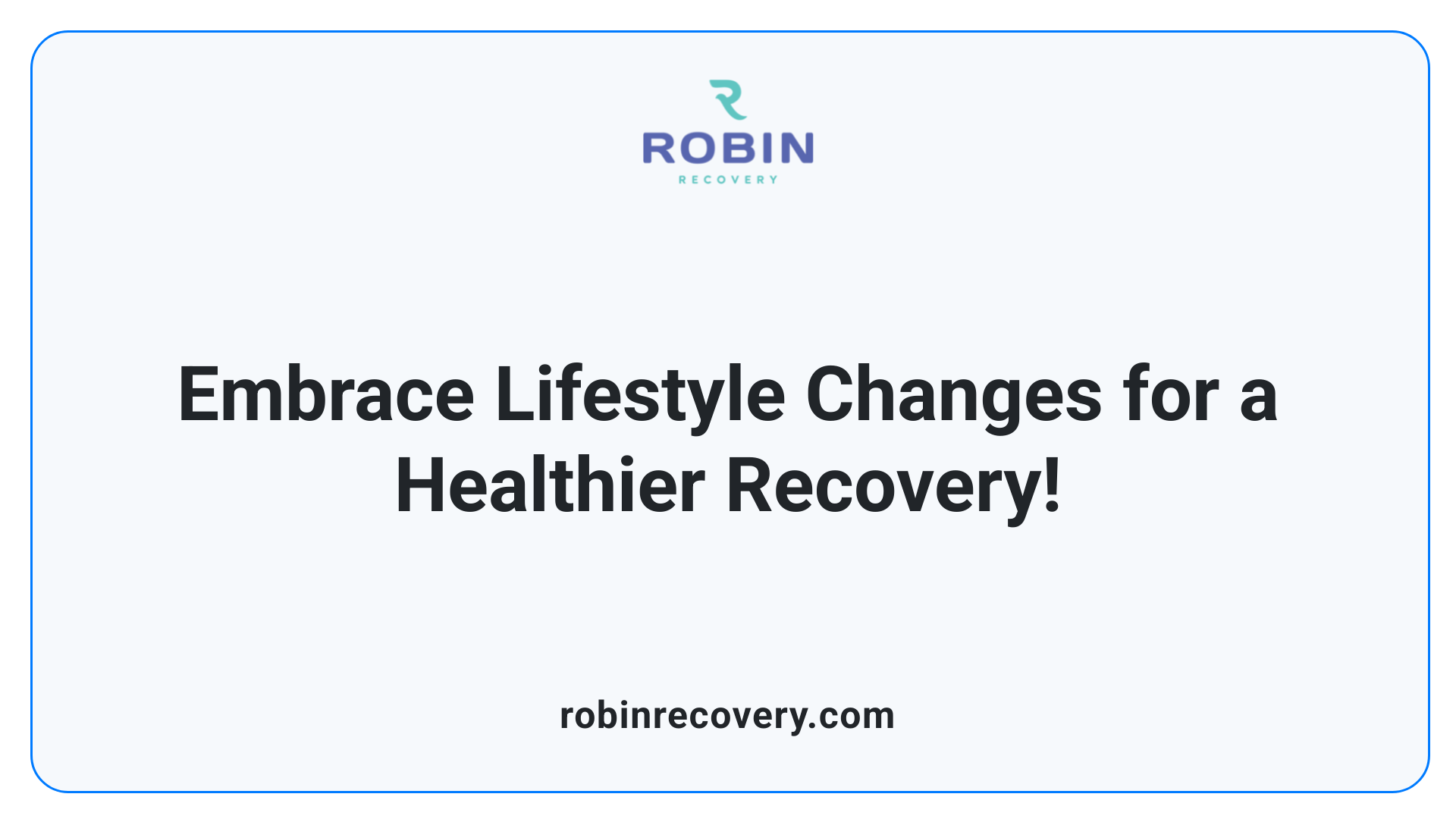How to find healthy hobbies during the recovery process

Discovering New Paths to Fulfillment
The journey to recovery from addiction often leaves individuals searching for ways to fill the void that substance use once occupied. Incorporating healthy hobbies into daily life can serve as a therapeutic and fulfilling way to support recovery. This article seeks to guide you through choosing the right interests to nurture your body, mind, and spirit and help you on your path to sustained sobriety.
Fighting Boredom During Recovery

How can I fight boredom during recovery from addiction?
Fighting boredom during recovery can be a significant challenge, yet it is crucial to finding fulfilling activities. Engaging in meaningful hobbies can occupy your time and boost your self-esteem. Consider exploring new interests, or revisit hobbies you enjoyed before addiction, such as painting or playing an instrument.
Volunteering is another excellent way to fill your time. It fosters a sense of purpose and connection to your community, contributing positively to your emotional well-being. Moreover, connecting with a social support network through groups like Alcoholics Anonymous (AA) or SMART Recovery not only helps you stay accountable but also provides valuable emotional support.
Importance of finding meaningful activities
Finding activities that have personal significance can greatly enhance your recovery journey. Healthy hobbies, whether they are creative, physical, or social, can help combat feelings of isolation. For instance, engaging in sports or joining community classes can create opportunities for making friends, which is essential for maintaining long-term sobriety.
Role of exercise in combating boredom
Incorporating physical exercise is vital in managing boredom and promoting overall health. Activities such as running or yoga can boost your mood, release endorphins, and provide a constructive outlet for stress. It's essential to stay engaged mentally and physically; mindful hobbies like gardening or martial arts not only improve physical fitness but also enhance your emotional resilience, reducing the risk of relapse.
Engaging in a mix of these activities can transform your experience in recovery, filling your time with purpose and excitement.
Lifestyle Adjustments to Support Recovery

What lifestyle changes are recommended to support recovery?
To effectively support recovery, individuals should adopt a healthy lifestyle that prioritizes balanced nutrition, regular exercise, and sufficient sleep. These elements are crucial for maintaining overall well-being. Incorporating physical activities such as yoga, swimming, or hiking not only boosts physical fitness but also enhances mental health by reducing stress and anxiety.
Building a strong social support network is fundamental in the recovery journey. Surrounding oneself with understanding friends, family, and support groups empowers individuals, providing motivation and emotional backing. Mutual-help groups like Alcoholics Anonymous offer a sense of community that is vital during recovery.
Furthermore, identifying and avoiding triggers is essential. This includes steering clear of stressful environments or toxic relationships that can increase the risk of relapse. Engaging in fulfilling hobbies—whether creative like painting or physical like martial arts—also helps in rediscovering joy and purpose in life without substances.
Additionally, establishing structured daily routines, celebrating sobriety milestones, and maintaining regular check-ins with therapists enhances resilience and progress during recovery. Building healthy habits and embracing new interests can significantly improve long-term recovery outcomes, offering a solid foundation for sustained sobriety.
Reintegrating Enjoyable Activities into Life

What are some strategies for reintegrating enjoyable activities into life post-addiction?
Reintegrating enjoyable activities into life after addiction can be a fulfilling yet challenging process. Start by revisiting hobbies you previously enjoyed or exploring new interests that resonate with your current self. Consider creating a list of past hobbies to rekindle prior passions, and don’t hesitate to experiment with novel activities that could spark joy.
Building a supportive network
Surrounding yourself with a strong support network is crucial. Joining mutual-help groups like Alcoholics Anonymous or community classes can provide encouragement and foster accountability in your recovery journey. These groups not only help combat feelings of isolation but also emphasize shared experiences, making it easier to connect with others who understand your path.
Establishing a new routine
Establishing a structured routine is essential for a healthy recovery. Incorporate enjoyable activities into your daily schedule, ensuring they include exercise, healthy meals, and stress management practices. Prioritizing these aspects is vital for maintaining wellbeing and significantly reduces relapse risks. Engaging in volunteering or community service can also enhance fulfillment and build meaningful connections with others.
Hobbies as a Defense Against Relapse

How do hobbies help in preventing relapse and supporting well-being?
Hobbies play a vital role in preventing relapse and supporting well-being by providing structure and purpose in daily life. Engaging in meaningful activities helps fill the void left by addiction, replacing negative behaviors with constructive outlets.
Here are some key benefits:
- Stress Relief: Hobbies offer individuals a way to channel stress and boredom, which are both significant triggers for cravings. Creative outlets, such as painting or writing, allow for emotional expression and relaxation.
- Skill Development: Learning new skills through hobbies can enhance self-esteem and resilience. Whether it’s cooking gourmet meals or mastering a musical instrument, achieving personal goals provides a sense of accomplishment.
- Social Connections: Activities like joining a sports league or a book club foster community and support networks. These connections reduce feelings of isolation, creating an environment where sharing experiences becomes easier and more beneficial.
- Identity Reconstruction: Hobbies help individuals rediscover who they are beyond substance use. This journey of self-discovery is fundamental for emotional stability and long-term sobriety, promoting a healthy lifestyle filled with passion and interests.
By integrating hobbies into recovery, individuals can assert control over their lives, build resilience, and reduce the likelihood of relapse effectively.
Navigating Hobbies and Responsibilities

Balancing hobbies with other responsibilities
To develop healthy hobbies without compromising other important activities, prioritize effective time management. One strategy is to allocate specific time slots for hobbies that align with essential activities such as exercise, work, sleep, and socializing. This creates a structured routine that supports recovery while allowing personal interests to flourish.
When choosing hobbies, consider engaging in a variety of activities. Research indicates that having multiple hobbies enhances overall health and emotional balance. By diversifying your interests, you reduce the risk of becoming too attached to any single pursuit.
Benefits of diverse hobbies
Diverse hobbies contribute positively to mental well-being. For instance, physical activities like yoga, meditation, or hiking improve physical health and promote mindfulness. Meanwhile, creative outlets such as painting, writing, or music can help express emotions productively, alleviating stress during challenging times.
Moreover, social activities like volunteering or joining a book club foster connections and build supportive communities, which are vital during recovery. These hobbies not only enrich your life but also serve as important distractions from stressors that may trigger cravings.
Managing fear of missing out
The fear of missing out (FoMO) can negatively impact recovery, leading to unhealthy lifestyle choices. Recognizing its signs is crucial; limit your time on social media to reduce exposure to posts that exacerbate this pressure.
Consider incorporating healthy snacks and hydration during hobby sessions to maintain energy without neglecting nutrition. If feelings of FoMO persist, explore techniques from cognitive behavior therapy (CBT) to help manage emotions and behaviors effectively.
Engaging in new activities and rediscovering old hobbies can facilitate personal growth, offering a sense of accomplishment essential for recovery.
Incorporating New Hobbies into Daily Life
How can I incorporate new hobbies into my daily routine during recovery?
Incorporating new hobbies into your daily routine during recovery can significantly enhance your well-being and support your sobriety. Start by identifying activities that resonate with your personal strengths and interests. This could include:
- Joining a sports team: Engaging in physical activities promotes fitness and helps alleviate cravings.
- Taking a class: This could be anything from art to cooking, allowing exploration of creativity and skill development.
- Volunteering: Helping others not only provides a sense of purpose but also fosters community connections.
Establish a structured daily routine that dedicates specific times for these hobbies. This structure is essential to fill the void left by substance use and manage potential triggers effectively.
Building self-esteem and coping mechanisms
Engaging in these hobbies can also boost your self-esteem by creating opportunities for achievement and progress. This sense of accomplishment is integral in developing healthier coping mechanisms for stress and negative emotions. Remember, recovery is a personal journey, so practice patience with yourself. Allow time to not only rediscover old passions but also explore new interests that can help enrich your life.
The Therapeutic Power of Hobbies
Hobbies Enhancing Mental Health and Self-Expression
Engaging in various hobbies can have profound effects on mental well-being. Participating in creative pursuits like painting, writing, or music allows individuals to express emotions that may otherwise remain unaddressed. These activities promote self-discovery and encourage personal growth, helping individuals build a new identity beyond their past substance use.
Engaging in Creative and Physical Activities
Both creative and physical hobbies are essential for recovery. Activities like yoga, hiking, or martial arts boost physical health and promote mindfulness. These forms of exercise release endorphins, which enhance mood and relieve stress. In contrast, creative hobbies serve as a therapeutic outlet for emotions, enabling individuals to process feelings productively.
Hobbies for Stress Relief and Mindfulness
Hobbies offer vital stress relief and promote mindfulness. Activities such as gardening, knitting, and meditation foster a connection to the present moment, enhancing emotional regulation. Group hobbies, including volunteering or participating in team sports, create community support, reducing feelings of isolation and loneliness, which are crucial during recovery.
Engaging in these activities not only fills time but also helps individuals constructively manage stress, offers distractions from triggers, and fosters connections that support sustained sobriety.
Embracing a New Lifestyle
Navigating life after addiction requires not only abstaining from substances but also embracing a new lifestyle filled with positive activities and interests that foster healing and growth. Discovering healthy hobbies during the recovery process is an indispensable step in this journey. These pursuits not only fill time and spaces previously occupied by addiction but also promote mental, physical, and emotional well-being. By cultivating these interests, individuals can forge a new path—one imbued with purpose, connection, and fulfillment. Remember, recovery is an ongoing process, and with each hobby pursued, a new facet of life emerges, bringing hope and stability.
References
- Hobbies & Activities for Recovering Addicts: How to Fill Leisure Time
- Good Hobbies to Try in Recovery - Ashley Addiction Treatment
- Healthy Hobbies: Finding New Interests to Replace Old Habits
- 8 Healing Hobbies to Support Addiction and Mental Health Recovery
- A Guide to Finding New Hobbies During Recovery - Reco Institute
- 25 Sober Hobbies for a Stronger Recovery
- Rediscovering Life: The Power of Hobbies in Addiction Recovery
- The Role of Hobbies in Building a Fulfilled Life | Silver Ridge Recovery
- Addiction and Recovery: 13 Hobbies You Can Try - Haven House
- Finding Healthy Hobbies and Activities: Filling the Void
